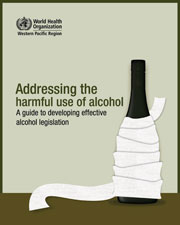
World Bank report recommends evidence-based alcohol policies to reduce road traffic injuries in Africa
Controlling non-communicable diseases and road traffic injuries are key public health issues in Africa, concludes a new report from the World Bank. The report recommends population-based interventions to regulate availability and marketing of alcohol to reduce the number of injuries from road traffic.
 The new World Bank report starts by pointing to the shift in health burdens in Sub-Saharan Africa: “Communicable diseases have long been the leading causes of death and the disease burden in SSA – and in many countries still are – but rising incomes, population growth and ageing, globalization, rapid urbanization and changing lifestyle practices are shifting the disease pattern.”
The new World Bank report starts by pointing to the shift in health burdens in Sub-Saharan Africa: “Communicable diseases have long been the leading causes of death and the disease burden in SSA – and in many countries still are – but rising incomes, population growth and ageing, globalization, rapid urbanization and changing lifestyle practices are shifting the disease pattern.”
Urbanization is linked to an increase in risks for traffic injuries: “SSA is urbanizing faster than any other region. Living in an urban environment is associated with decreased physical activity and increased cardiovascular risk, while air pollution is an emerging issue. The risk of crashes and injury increases with a poorly regulated transport sector, the lack or non -use of seat belts, hazardous road environments, poor maintenance of vehicles and roads, and deficient monitoring and enforcement.”
Over the last 20 years, SSA has seen a shift in the attributable burden of disease of risk factors away from risks for communicable diseases in children towards those for non-communicable diseases (NCDs) in adults. A nutrition transition is underway, with an increase in female obesity in some population groups; and lifestyles practices are changing. Tobacco use among young people has increased, particularly of products other than cigarettes. Harmful alcohol consumption is a common risk factor for both NCDs and road traffic injuries (RTIs), as well as for intimate partner violence and HIV. Drinking is expected to increase in the region with further economic development – Africa already has the highest prevalence of heavy episodic drinking of any region.
The WB report recommends a comprehensive strategy to reduce traffic injuries in Sub-Saharan Africa, including both general population-based interventions to reduce drinking levels and specific interventions to prevent drink-driving and injuries caused by drink drivers.
Says the report: “A substantive evidence base also shows that making alcohol more expensive and less easily available, banning alcohol advertising and its promotion, and enforcing drink-driving legislation or countermeasures are cost-effective in reducing alcohol-related harm.”
Furthermore, “Population-level interventions are not reliant on health services for delivery: costs are relatively low and they may even generate funds; they have relatively little “downside”; most people will be exposed to them; and people who are at high risk or already suffering from NCDs will benefit. Population-level prevention, particularly in resource-limited countries, benefit from a strong regulatory and fiscal framework, particularly for tobacco control. Most cost-effective measures to reduce risk factors are in the domain of agencies or ministries other than health, such as ministries of trade, finance, agriculture, and transport, but may challenge vested interests and face strong lobbying by tobacco, alcohol, and other industries. Therefore, while they include some of the cheapest and most effective interventions (such as tobacco and alcohol taxation), they may be politically difficult to achieve, requiring robust, high-level leadership and/or effective impacts to build partnerships and garner broad support.
For the so-called ultra-processed food and drink industries, as with tobacco and alcohol, there is clear evidence that public regulation and market intervention can help prevent the potential harm caused by ‘unhealthy commodities’, and that these industries should not have a role in national policy formulation, the report recommends.
Road traffic injuries should also be reduced by setting and enforcing legal blood alcohol limits and minimum drinking age laws, using checkpoints to stop drivers randomly to detect alcohol, and running mass media campaigns to reduce drinking and driving. Other measures, such as license revocation and suspension, markedly reduce fatalities from alcohol-related crashes.
![]()
![]()
Developed with CustomPublish CMS by Nettinfo AS


